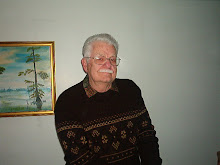musings120710, Amen in Hebrew and Greek, by John
This may not interest many people, but it is straight from the Bible.
I'm not sure how many times "amen" appears in the entire Bible. In the NIV, it appears about 130 times, less in the KJ, but the word both in Hebrew and Greek can have slightly different meanings. That allows translators to decide on the best definition.
In Hebrew the accent might be on the last syllable, phonetically ah-MAHN, and in Greek it varies. In the King James version, John 5:24 has it translated, "Verily, verily." In Greek, it appears twice. That was the Greek way of emphasizing the importance of what was to follow much like some people today may say, "That was really, really good!" The NIV translates it, "I tell you the truth." No matter the language, amen means true, or truth. The same three Hebrew letters can have a different meaning when different vowel sounds are applied. With one set it can mean, "turn to the right." With another it can mean "cunning" with the idea of being well trained. Since the original Hebrew had no vowel sounds, we depend on the Masoretic text to provide them. The Masoretes were a group of scribes who realized Hebrew was becoming a forgotten language. To preserve the exact meaning of the Old Testament, they added markings to show how to pronounce the words. They felt limited because of the Old Testament warning to take away nothing and to add nothing to the text, so they developed a way to leave the text itself as it was, but to put underneath each letter the appropriate vowel indicator. We would call their markings dashes, two dots aligned horizontally, three with the triangular apex turned down, or a tiny tee. With these marks, we know how each word should be pronounced. As an example suppose our language had no written vowels, and you saw "thr." It could be "other," "there," "their," "ether," "either," and I suppose the list could be extended a lot more. Can you imagine trying to read a sentence written without vowels? Take a look, "cnymgntrygtrdstncwrttnwthtvwls?" I forgot to mention, ancient scripts most frequently omitted spaces between words, too. If you haven't figured that sentence out yet, it repeats the one preceding it.
All of this should emphasize how technically hard it is both to keep a language alive, and to translate one into another accurately.
I've never considered myself to be good with languages. When my wife had a little Mexican boy enrolled in her second grade class, she introduced us explaining that he could not speak English. He managed a little bow and I said in English that I was glad to meet him. He grinned, and as I was going out, I said, "No tome usted ningunos centavos cinco de madera!" He looked surprised, and blurted out, "No spik Engles!" My wife said, "Oh! My husband spoke to you in Spanish!" He smiled and nodded, but I knew he didn't understand. That's a rough translation of, "Don't take any wooden nickels." I haven't used Spanish since 1953.
As I said, I've never been good with languages, but I am sure of this, When Jesus said, "Amen! Amen!" what followed was of vital importance. The King James version says, "Verily, verily, I say unto you, He that heareth my word and believeth on him who sent me, hath everlasting life, and shall not come into condemnation: but is passed from death unto life!" That is really, really true!


0 Comments:
Post a Comment
<< Home